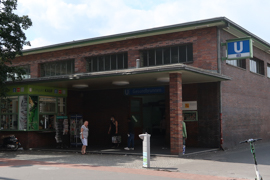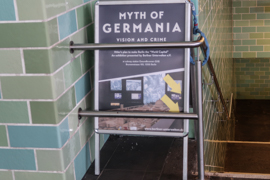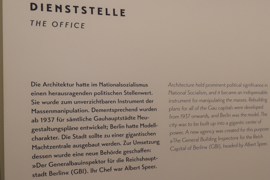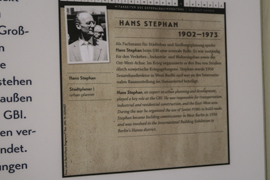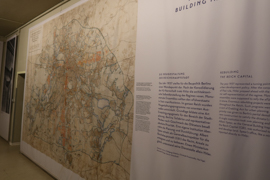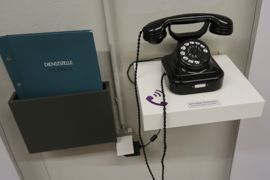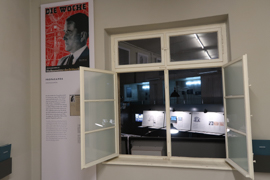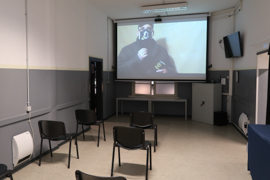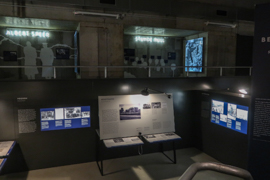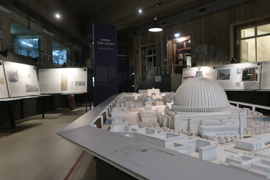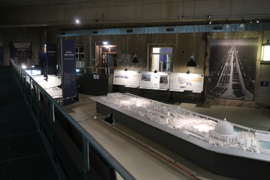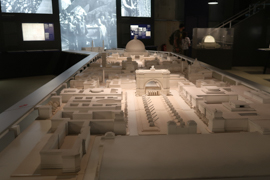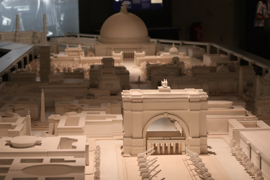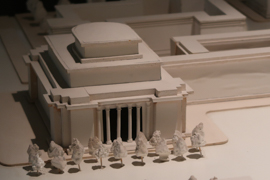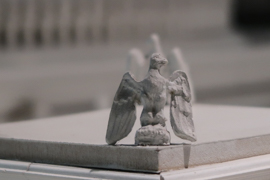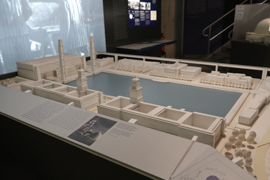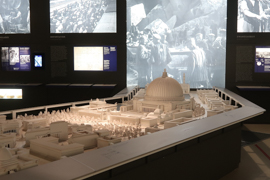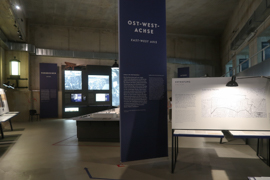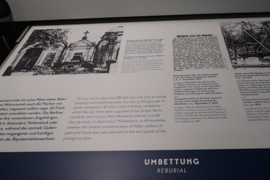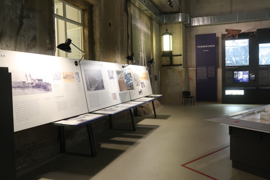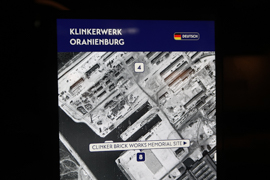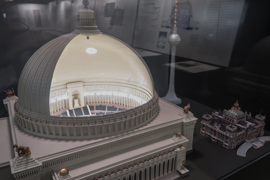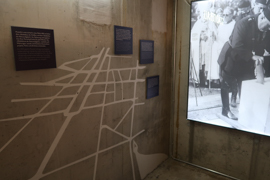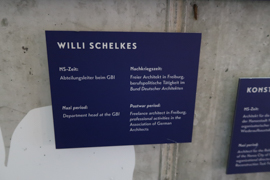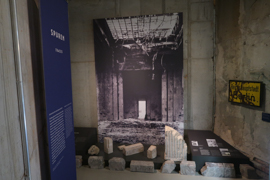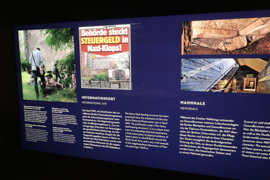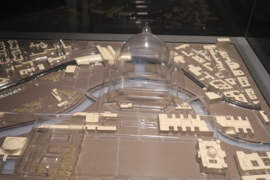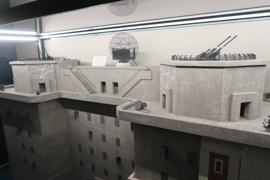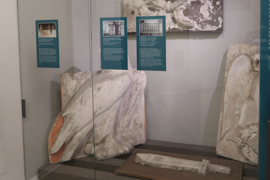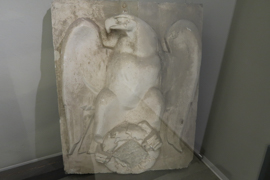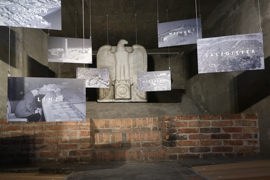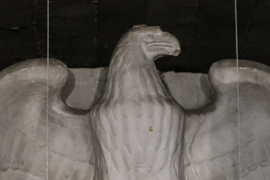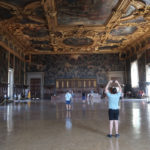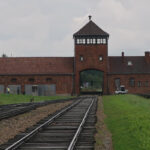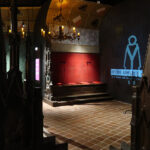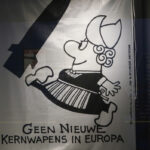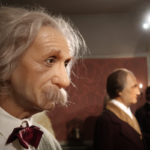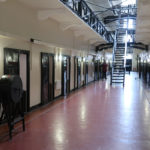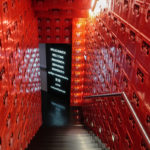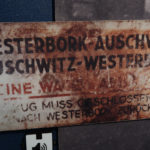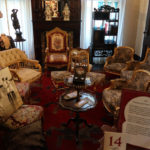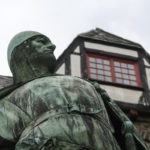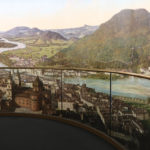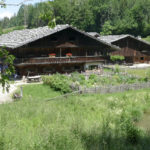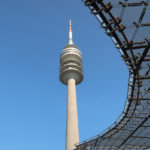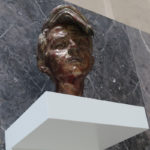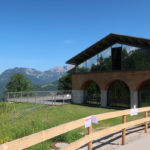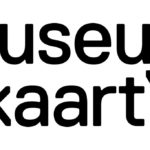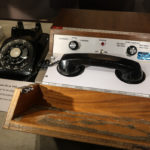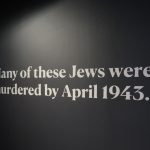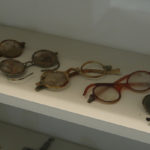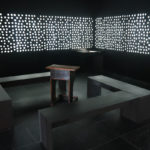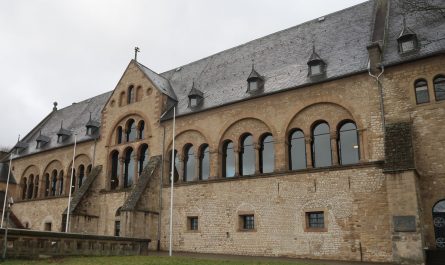Mythos Germania - Vision und Verbrechen
6 Euro
Flyctory.com Pros
- Very good and very detailed museum
- Germania topic is not too often presented in other museums
- Wide range of aspects about the Germania plans
Flyctory.com Cons
- Limited opening hours
- Not barrier free
It is almost needless to say that Adolf Hitler was obsessed with megalomanic ideas. Apart from ruling the world and mass murders, here also recklessly drove some hard-to-believe plans in very domestic affairs. One of these plans was Germania, the transition of Berlin to an impressive and triumphant capital of Germany – and the world. Unfortunately, there are not too many museums about this topic. In Berlin, the society Berliner Unterwelten (“Berlin Underworlds”) drive an exhibition about this topic in previously hidden rooms of the Gesundbrunnen station. The full name is Mythos Germania – Vision und Verbrechen – “Myth of Germania – Vision and Crimes”. In non-pandemic times, the Unterwelten also offer various guided tours to different topics.

Myth Of Germania – Location & Admission
To access the exhibition floor of the Berliner Unterwelten, you need to enter the U8 Underground Station Berlin-Gesundbrunnen, which is in front of the modern shopping mall. On the right, an escalator leads you directly to the platform. You have to take the staircase on the left. About half-way to the platform, there is a metal door on the left (when you come from the shopping mall). That already tells you that the exhibition is not barrier-free and can thus not be visited by people with limited mobility.
At the time of writing, the exhibition is only opening on Saturdays, 11:00 to 17:00 hrs. Adult admission is 6 Euro. If you also do a guided tour with Berliner Unterwelten, the exhibition admission price reduces to 3 Euro only. Taking pictures is typically not allowed – I thank the Berliner Unterwelten for allowing me to introduce you to this place.




Myth Of Germania – The Visit
The museum is bilingual, in German as well as in English. At some spots, there are folders, which allow you do dig deeper into certain topics. One thing I liked is that on several spots of the exhibition, they are introduce you to main characters of the Germania plans. Most of them are managers and key roles of the Generalbauinspektor (short: GBI, translates to “General Building Inspektor”), who was responsible for the upgrade of Berlin on architecture level. A good way to start your visit is spending a few minutes with the introduction movie.




After that, you head into the key exhibition room. Each section of the museum is typically focusing on a certain topic. Thereby, the Mythos Germania museum really gives a deep insight into the plannings. For example, you also learn how people were forced to move away or how the Nazis planned to move who cemeteries to fulfill their plans. The key exhibit, though, is in the middle of the room. A huge scale model shows the vast transformation which was intended. It indeed plays the role of the hortatory element of the museum.
















Another very impressive model in the exhibition features the Große Halle (“Great Hall”), an arena-like giant building which was expected to host some 180,000 spectators. Later during your visit, a transparent plastic model on top of the structure of the nowadays governmental area at the Spreebogen shows how this plans would fit into the Berlin of 2021.The museum also shows how Albert Speer, the key head behind the Germania plans, became some sort of media star after he had served his sentence At the end of the visit, you also see a few of the (rather rare) original parts of former Nazi buildings. The museum also refers to restructuring plans of other German cities.












Myth Of Germania – Services
The staff was really helpful and friendly. The museum also drives a small book shop at the entrance.
Myth Of Germania – My View
If the limited opening times suit your plans at your next Berlin visit, I absolutely recommend to visit the Mythos Germania exhibition. It is really well done – and at least I learned a lot of things which haven’t been too much in my focus before. Really very good place!
Museums & Exhibitions – 2021 Top Picks!
Here are the 2021 published Museums & Exhibitions reviews which lead to a Top Pick!:

The Tränenpalast ("Palace of Tears") in Berlin is the former border crossing point between East and West Berlin. It is located at ...

Without a doubt, the Scala in Milan is one of the most famous opera houses in the world. While I ...

While nature lovers, highland road freaks and horse riders roll over Iceland in summer, the key attraction in fall and ...

Lava and volcanic eruptions are a regular part of life on Iceland. In 2010, for example, the Eyjafjallajökull slowed down ...

Venice is an iconic place by itself - but it has some real key attractions as well. Without a doubt, ...

Delayed by one year due to Covid-19, Dubai hosts the Expo 2020, the World Exhibition in between 1st October 2021 ...

What do Icelandic people do if there is a public toilet in the heart of their capital, which they don't ...

From outside, the Auto & Traktor Museum Bodensee ("Car and Tractor Museum") at Lake Constance looks like a traditional old farm ...

Without a doubt, Luciano Pavarotti is one of the biggest music legends in recent history. The Italian is regarded to ...

The same faith which applies to Oswiecim in Poland (better known under the former German name Auschwitz) is also valid, ...

Auschwitz is a town's name (adopted to German) which you typically link with murder, cruelty, state-organized mass killings, injustice. A ...

Half of us got one - and most of them love it/him. The philosopher Nietzsche even defined a penis envy ...

Ship lifts are one of the most fascinating technical constructions to me. Being able to move ships like in an ...

Businessman, actor, bodybuilder, producer and - last, but not least, politician - it is really hard to list all roles ...

If you think about oil producing countries, you may think about the USA or the United Arab Emirates. In fact, ...

Not only because auf an early 1990's video game, I am deeply interested in the Hansa and its history. Thus, ...

A very interesting rebranding: when I started to explore museums in the nearby Netherlands, the Dutch Freedom Museum in Groesbeek ...

The place where the story of the famous (typically) red cars started? Walking on the routes of the Ferrari company ...

Have you ever heard of Surströmming, Hakarl or Spam? Do you mind eating eyes or drinking cow blood? All these ...

If you know the name Carlo Pedersoli by heart, then you are likely ready to head to Berlin since 27th ...

A Panoptikum is a place for everything you can see, if you translate it roughly. The Hamburg Panoptikum in St ...

The Northern Ireland conflict - or simply called The Troubles is one of the most intense civil conflicts I experienced during ...

The National Monument Camp Vught - or Konzentrationslager Herzogenbusch, which has been the German name during the Nazi era - is ...

Professional stargazing: The European Southern Observatory, short ESO is a collaboration of multiple European countries to gather astronomic forces on the ...

A museum with an amazing collection of luxury and top-class racing cars, driven for the cause of charity. This is ...

The story why I felt I had to visit the Bergisches Museum für Bergbau, Handwerk und Handel - the Bergisches ...

Even though I am not a beer drinker, I made a brewery tour during my last stay in the Salzburg ...

Even though the Netherlands capitulated against Germany just after a few days under attack during World War II, they have ...

While the Arabian word Etihad for many people first of all stands for a major airline based in the capital of ...

Nuremberg (or Nürnberg, how it is named in German) has some sort of tough political-historic heritage. Several sites still remember ...

In February 2020, I visited a lovely aviation museum in Santa Ana, Greater Los Angeles: the Lyon Air Museum is ...

In 1944, the 101st Airborne Division, called Screaming Eagles, landed North of Eindhoven in the Netherlands. As part of the Operation Market ...

When you visit Dubai or the United Arab Emirates in general, you likely think about the parks, skyscrapers, sun and ...

In 1891, Henry B. Plant founded the Tampa Bay Hotel. Nowadays, the National Historic Landmark in central Tampa is no ...

Schloss Burg is just about half an hour away by car from my home town Cologne. The castle on the ...

During a prolonged stop-over at Manchester Airport, I grabbed a rental car for a day and did some sightseeing in ...

After my visit of the Panorama Mesdag in The Hague / Den Haag, Netherlands, I just had to visit the ...

Two Olympic Gold Medals and multiple other medals and World Cup victories (with a special focus on Super-G) - undoubtedly, ...

Undoubtedly, Munich Olympic Tower is one of the iconic buildings of the Bavarian city. Even though the tower is located ...

Gronau in the Münsterland region in Western Germany calls itself the "Music City". The some 50,000 inhabitant town is definitely not the ...

The blue and white porcelain from Delft is a globally well-known brand. While my wife and I spent time in ...

The Weiße Rose / "White Rose" was a resistance group during the German Nazi regime. Mainly consisting of university students, she ...

The Berchtesgadener Land is not only nowadays well-known as a popular tourist destination, there is also a dark part of ...

A museum with 90 vintage cars and so-called Yountimers might not feel to thrilling. If you add that about half of ...

If you are on a city trip, you likely fancy to buy a multi-attraction ticket. There are global companies like ...

What would a visit to the Silicon Valley be without at least visiting one computer museum? Duing my February 2020 ...
Nazi Germany Memorials
Here are all places memorizing about the cruelties during the German Nazi leadership:

The former concentration camp site at Bergen-Belsen might not be as prominent as Dachau, but it is nonetheless one of ...

The Museum of Jewish Heritage in New York City also calls itself A Living Memorial to the Holocaust. Even though I ...

During the Nazi regency in Germany, the Emslandlager (Emsland Camps) was a group of concentration and detention camps in the Emsland region, ...

It is time for the final posting of the years, simply named The Best Ones 2021. After looking into my ...

The same faith which applies to Oswiecim in Poland (better known under the former German name Auschwitz) is also valid, ...

Auschwitz is a town's name (adopted to German) which you typically link with murder, cruelty, state-organized mass killings, injustice. A ...

A very interesting rebranding: when I started to explore museums in the nearby Netherlands, the Dutch Freedom Museum in Groesbeek ...

The National Monument Camp Vught - or Konzentrationslager Herzogenbusch, which has been the German name during the Nazi era - is ...

Even though the Netherlands capitulated against Germany just after a few days under attack during World War II, they have ...

Nuremberg (or Nürnberg, how it is named in German) has some sort of tough political-historic heritage. Several sites still remember ...

The Weiße Rose / "White Rose" was a resistance group during the German Nazi regime. Mainly consisting of university students, she ...

The Berchtesgadener Land is not only nowadays well-known as a popular tourist destination, there is also a dark part of ...

Nuremberg is deeply linked to the German Nazi regime between 1933 and 1945. The key reason for that are of ...

Especially in the recent past, I read a couple of ridiculous comparisons between certain people and political groups (which I ...

When you think about Nazi Germany murders, you typically think of extermination camps like Auschwitz or the concentrations camps. A ...

Braunau am Inn - the small town right at the Austrian-German border is indeed a picturesque place and a nice ...

On 21st October 1941, the German Wehrmacht slaughtered thousands of civilians in Kragujevac, Serbia, to revenge dead and wounded soldiers ...

The Royal Ontario Museum just feels like an amazing wonderland of topics, a bit of "something for everyone". Did you ...
